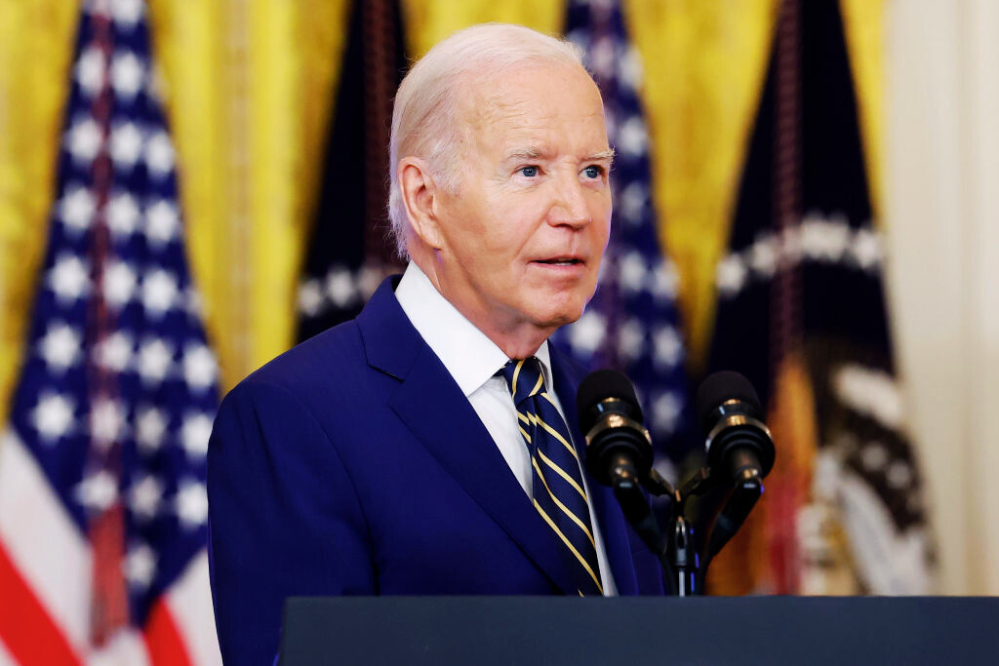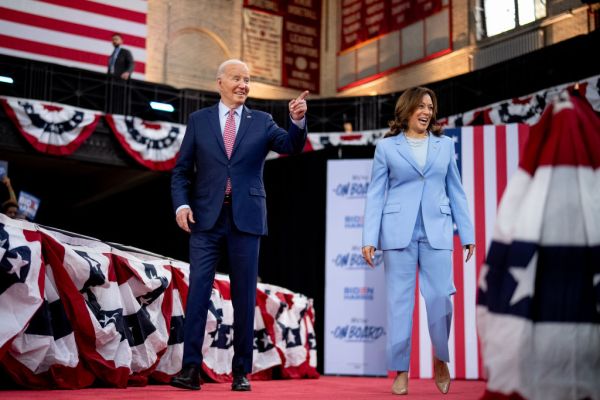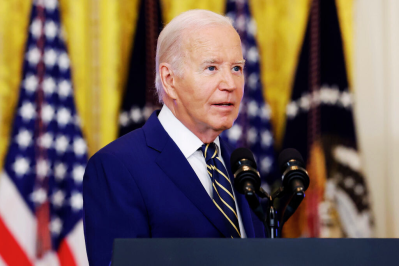A cheery thought for Wednesday: What if, in a month or two, Donald Trump finds himself on a glide path to reelection?
Not long ago, that looked to be the one scenario for the campaign that could be safely ruled out. There was a “Joe Biden landslide” scenario, a “Biden wins narrowly” scenario, and a “Trump wins narrowly” scenario, but no scenario in which a coup enthusiast with four criminal indictments hanging over his head wins comfortably.
Maybe there still isn’t. Trump leads by slightly more than a point in the RealClearPolitics national polling average and by just 2.3 points in his best Rust Belt battleground. He’ll need to win one of those states to secure 270 electoral votes. Biden is competitive in all of them.
But five months out from Election Day, it’s now entirely possible to imagine a race in which the president falls behind nationally by 4 points and never recovers. A bad debate performance in a few weeks could place him on that track. So could an especially cringeworthy “senior moment” before the cameras or left-leaning independents tuning into the race and concluding that Robert F. Kennedy Jr. is a suitable “none of the above” option.
It’s long been easy to imagine Trump winning, but only recently, I think, has it been easy to imagine him building enough of a lead that by September his victory looks like a fait accompli. In 10 days or so, we’ll have an idea from the polling whether his conviction in Manhattan has alienated any voters. If it hasn’t—or, worse, if it’s actually moved voters toward him—that’ll be a strong indicator that Joe Biden can’t win. It’ll mean that opposition to the incumbent is so diamond-hard that realistically nothing will cause it to soften before November.
I mention all of that as an introduction to a long story that the Wall Street Journal published on Tuesday night. The title? “Behind Closed Doors, Biden Shows Signs of Slipping.”
The Journal interviewed 45 people from both parties about the president’s comportment in private meetings, some of whom witnessed it firsthand and others of whom were briefed on it afterward. “Most of those who said Biden performed poorly were Republicans,” the paper acknowledged, “but some Democrats said that he showed his age in several of the exchanges.”
How nervous was the president’s team after it got wind that the story was in the works? This nervous:
The White House kept close tabs on some of The Wall Street Journal’s interviews with Democratic lawmakers. After the offices of several Democrats shared with the White House either a recording of an interview or details about what was asked, some of those lawmakers spoke to the Journal a second time and once again emphasized Biden’s strengths.
“They just, you know, said that I should give you a call back,” said Rep. Gregory Meeks, a New York Democrat, referring to the White House.
The Journal piece is, understandably, the talk of American political media as I write this. There are destined to be more stories like it before Election Day. If and when Trump opens up a sizable lead on Biden, I suspect that the doubts it describes over the president’s health will be the single biggest factor why. Unlike inflation and immigration, it’s the one problem Biden has that can’t even theoretically improve before November.
Imagine you’re his campaign manager, tasked with minimizing the political damage from concerns about his fitness for office. What would you do?
How does one “message” Joe Biden’s age effectively?
Broadly speaking, there are two options. One is to feign indignation at the very idea that the president might be physically or mentally diminished.
Call it the “don’t believe your lying eyes” strategy.
Many a Trump critic deployed it on Wednesday to try to undermine the Journal piece, most notably Joe Scarborough of MSNBC. On his morning show, Scarborough correctly questioned why former Speaker Kevin McCarthy was a key source for the story when McCarthy had reportedly found Biden to be “sharp and substantive in their conversations” last year.
Then he went further and insisted that Biden remains more cogent in private discussions—with respect to international affairs and passing legislation, at least—than any House speaker of the last 30 years. Paul Ryan, Newt Gingrich, Nancy Pelosi, all of ‘em.
You’ve seen Biden in action rhetorically on television many times. Who are you going to believe, Morning Joe or your lying eyes?
The president himself deployed the “lying eyes” strategy in a recent interview with Time magazine. When asked whether he truly believes he could do the job as an 85-year-old man, he answered Time’s reporter with annoyed bravado. “I can do it better than anybody you know,” he said. “You’re looking at me, I can take you too.” Lobbyist Liam Donovan called that Biden’s “Jack Palance schtick,” referring to the then-73-year-old tough-guy actor who resorted to doing one-armed push-ups onstage at the Oscars to prove his vitality.
Again, you’ve seen the president in action. Does he, in your opinion, evince the youthful vim of a roughneck who could “take you”?
The “lying eyes” strategy is quite Trumpy in spirit, as it aims to replace observable reality with a politically convenient fiction through brute rhetorical force. And as with Trump’s lies, the target is mainly members of the president’s own party whose misgivings about him might otherwise lead them to wander off the partisan reservation. “Can you believe what these lying Republicans like Kevin McCarthy will say to try to help Trump?” isn’t the worst point to make to a loyal Democrat who read the Journal piece and found himself troubled anew about Biden’s ability to serve another term.
But I’m skeptical that anyone who isn’t already on the reservation will be persuaded by it. A partisan might feel a duty to reject the evidence of his eyes and ears upon being commanded to do so by his party, but why would an undecided voter care after spending three years absorbing evidence of the president’s senescence?
Especially if that undecided voter remembers what Joe Biden looked and sounded like in better days. The president has been in public life for half a century. When gauging his decline, voters are not just measuring Biden against Paul Ryan, Newt Gingrich, or Nancy Pelosi. They’re measuring him against himself.
Which brings us to the second messaging option, what we might call the “yes, he’s old, but” approach.
Under this strategy, there’s no pretending that Biden hasn’t been diminished by age, so it’s silly to even try. Instead, the topic should be confronted head-on by explaining to voters why it matters less than they think. One way to do that is by reminding them that the two candidates aren’t far apart in age—humorously, if possible:
Olivia Troye, who worked for the Trump White House before leaving in disgust, invited the Wall Street Journal to contact her if they’re interested in details of private meetings in which Trump’s own mental health seemed less than robust. “Yes, he’s old, but the other guy is also really old and maybe clinically insane” is one potentially effective way to deflect attention from Biden’s age.
Trump seems worried about it too. Amazingly, just hours before the Journal story was published, he posted a video on Truth Social with this caption: “JOE BIDEN IS NOT TOO OLD TO BE PRESIDENT—NOT EVEN CLOSE, BUT HE IS TOO INCOMPETENT AND CORRUPT!” That’s the sound of a man who fears that his opponent’s chief liability might be neutralized as more voters discover that Trump—who turns 78 next Friday—is older today than Biden was when he was elected in 2020. If we’re guaranteed a president who’ll be too old to serve within the next four years, why not choose the one who didn’t attempt a coup?
Another iteration of the “yes, he’s old, but” strategy is “Yes, he’s old, but he gets results.” According to this talking point, age matters in a politician only insofar as it impedes his ability to do the people’s business—and it hasn’t in Biden’s case. Democratic House staffer Aaron Fritschner pointed out that the private exchanges between the president and Republicans described in the Journal story invariably ended in policy wins for the White House, raising the question of what mental defects the other party might be suffering from if they’re forever being outwitted by a senile old man.
Biden himself tried to steer the discussion of his age away from cognition and toward policy outcomes in an ad he cut back in March. “Look, I’m not a young guy. That’s no secret,” he said, addressing the camera. “But here’s the deal: I understand how to get things done for the American people.”
“Yes, he’s old, but he gets results” is a shrewd messaging strategy—or it would be for a president whose mental wherewithal is questionable but whose agenda is broadly popular, like Ronald Reagan in 1984. That is … not the case with Joe Biden. On the contrary, I suspect that Americans blame his age to some degree for problems like inflation and immigration: After all, if he’s not “up to the job,” it stands to reason that crises would be more likely to develop and get out of hand on his watch. “He’s old but he gets results” doesn’t work if most voters don’t like the results.
And if they don’t like the results, you can’t persuade them to lay that aside and cast a vote for the young, capable team the president has put together instead of for him. As one of my editors put it this morning, Democrats aren’t going to win in November by telling people, “Sure, Biden’s old, but don’t worry: Antony Blinken and Jake Sullivan clearly have global affairs under control.”
As for “yes, he’s old, but the other guy is really old too,” that message also doesn’t work as well when the other guy is perceived as much more vigorous.
A recent Fox News poll found just 35 percent and 37 percent of Americans are at least “somewhat confident” in Biden’s physical and mental fitness for the presidency, respectively. For Trump, the numbers were 60 and 52 percent. There are Democrats older than Biden in office right now who betray no sign of cognitive impairment and accordingly are facing no pressure to retire, proving Trump’s point that it’s not age per se but mental competence that matters to voters. Americans appear to believe that Trump is considerably more cogent than the president is, in which case why would reminding them that he and Biden are almost the same age ultimately matter?
Because estimations of Biden’s fitness are already so low, I suspect that the “yes, he’s old, but” approach will always lead Democrats back to the “don’t believe your lying eyes” argument. Inescapably, they’re stuck having to convince voters that the grave doubts they harbor about the president’s capabilities are flatly incorrect or even unfair. Trump is indeed very old, and Biden has in fact had some major legislative achievements, but ultimately neither of those facts does anything to ease the widespread anxiety that the incumbent will die or descend into incoherence in a second term.
Those who read Tuesday’s newsletter already know the answer to the question I posed earlier. There is no right way to “message” Joe Biden’s age because, contrary to partisan belief, not all political problems are “messaging problems.”
The president’s health would be an insuperable barrier to victory if any other Republican were on the ballot, and it may very well be insuperable against Trump, too. There’s no spin so clever that can change that.
Democrats can and should deploy the two strategies I described above to help Biden-leaning voters rationalize away their jitters about his wherewithal, but I suspect undecideds will not be moved. If they end up preferring Biden to Trump, it’ll be less a matter of Democrats having made Joe Biden more acceptable to them than of having made Trump utterly unacceptable.
That’s why Biden and his party have begun saying “the F-word” on the trail. It’s why we’re destined to hear a lot about January 6—and abortion, of course—in Democratic ads in October. The president will continue to dangle policy bribes to disgruntled undecided voters between now and then to try to soften them up, and perhaps he’ll tantalize them with promises of some exciting Cabinet appointments in a second term, like making Michelle Obama Secretary of Fun or whatever. But ultimately, there’s no affirmative case for reelecting Joe Biden. There’s only a case for not reelecting Trump.
But this brings us back to the problem I described at the start of this piece. What if going scorched-earth against Trump isn’t enough?
Democrats have already scorched the earth pretty thoroughly by accusing him of harboring dictatorial ambitions, yet their candidate continues to trail in polls. There’s a solid chance that the 34 new felony convictions on Trump’s rap sheet will also fail to move the numbers. And there’s a distinct possibility that Biden will have a bad debate three weeks from now, irreversibly shaking public faith in his fitness.
By the end of the month, there could be a semi-serious debate on the left about replacing him at the convention. Some political problems simply can’t be messaged.
Replacing Biden as nominee would also risk a political disaster for Democrats—and not just because it would force the party to solve its unsolvable Kamala Harris problem. Even if they figured out a way to do that, their candidate would barrel into November facing a huge name-recognition gap with Trump. Many voters would accuse them of having played dirty pool by replacing an unpopular nominee at the last second, the latest example of election-year irregularities by Democrats. Undecideds might even hold Biden’s policy failures against the new nominee, reasoning that a member of his party would surely govern in the same way as the president has.
“Trump versus Random Generic Democrat” is a good match-up for Democrats in theory, insofar as it might make the race a referendum on the unpopular Republican. But ambushing voters by thrusting that choice on them 100 days out from the election, when many have already reconciled themselves psychologically to a second Trump term, wouldn’t shake out that way. The actual match-up voters would perceive is, “Should we stick with a known quantity like Trump or roll the dice on some rando plucked from obscurity who might be a closet communist for all we know?”
The deus ex machina option wouldn’t work for Democrats at this point, and I think they know it. The day-long freakout over the Wall Street Journal piece among the left on social media accordingly has a doth-protest-too-much quality to it, as if Biden’s party realizes it has an unsolvable and un-message-able problem here and can’t think of anything more useful to do about it than bash media outlets bent on reporting on it.
If Trump wins, that left-wing angst will be redirected into a ferocious round of recriminations among Democrats. They’ll blame Biden for having been too proud and stubborn to do the right thing for his party and his country by announcing his retirement earlier in the campaign. They’ll blame Chuck Schumer and Nancy Pelosi for not having done more legislatively to preemptively limit Trump’s executive authority when they had the chance in 2021 and 2022. And they’ll blame Democratic operatives for ever having believed that they could “message” their way out of a vast public consensus that the president was too feeble to serve another term.
It’ll be ugly. Everything about American politics after November 5 will be.







Please note that we at The Dispatch hold ourselves, our work, and our commenters to a higher standard than other places on the internet. We welcome comments that foster genuine debate or discussion—including comments critical of us or our work—but responses that include ad hominem attacks on fellow Dispatch members or are intended to stoke fear and anger may be moderated.
With your membership, you only have the ability to comment on The Morning Dispatch articles. Consider upgrading to join the conversation everywhere.